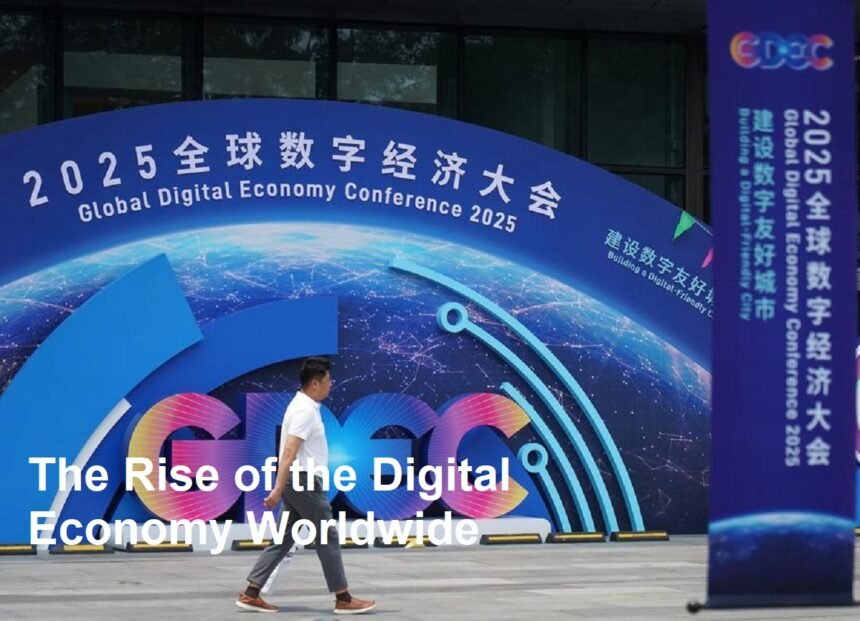Introduction
The way we live, shop, and work has changed dramatically over the past two decades. Much of this transformation can be credited to the digital economy. From ordering groceries online to making seamless payments with a smartphone, digital tools are redefining how people interact with businesses worldwide.
In this article, we’ll explore the key drivers of the digital economy, the rise of e-commerce, the growth of fintech, and the opportunities in online markets. We’ll also share practical tips for individuals and businesses to adapt and succeed in this new digital era.
What is the Digital Economy?
A Simple Definition
The digital economy refers to all economic activity driven by digital technologies—whether it’s buying products online, using mobile banking, or even remote work. Unlike the traditional economy, which relies heavily on physical infrastructure, the digital economy thrives on connectivity, data, and digital platforms.
Why It Matters
- It makes global trade faster and easier.
- It creates new job opportunities in tech, e-commerce, and online services.
- It lowers barriers for small businesses to reach international markets.
The Role of E-Commerce in the Digital Economy
How E-Commerce Changed Shopping
E-commerce is one of the strongest drivers of the digital economy. Instead of visiting physical stores, people now browse, compare, and purchase products with just a few clicks. Platforms like Amazon, Alibaba, and Shopee dominate global sales, but millions of small businesses also thrive by selling online.
Benefits of E-Commerce
- Convenience: Shop anytime, anywhere.
- Wider reach: Businesses can serve customers globally.
- Cost savings: Lower overhead compared to physical stores.
Practical Tips for Businesses
- Build an Online Presence – Even a small website or social media store can attract buyers.
- Leverage Marketplaces – Selling on established platforms like Amazon or Lazada can help you reach new customers quickly.
- Focus on Customer Experience – Offer secure payments, fast delivery, and responsive service.
Fintech: Redefining Finance in the Digital Age
What is Fintech?
Fintech (financial technology) refers to digital innovations in financial services, from mobile payments and online banking to cryptocurrency and peer-to-peer lending. It has revolutionized how people manage money, making transactions faster and often cheaper.
Examples of Fintech in Action
- Mobile Wallets: PayPal, Alipay, and Gojek’s GoPay make payments seamless.
- Online Lending: Platforms allow small businesses to get loans without going to banks.
- Cryptocurrency: Bitcoin and Ethereum are reshaping the idea of currency.
Practical Tips for Individuals
- Use Mobile Banking – Save time and track expenses easily.
- Adopt Secure Payment Methods – Choose trusted platforms with strong security.
- Stay Updated – Learn about new fintech trends like digital wallets, BNPL (Buy Now Pay Later), and blockchain.
Online Markets: Expanding Global Opportunities
The Power of Digital Platforms
The rise of online markets has opened doors for businesses of all sizes. From freelancers on Upwork to businesses selling digital products on Etsy, online platforms make it possible to connect with buyers across the globe.
Benefits of Online Markets
- Access to international clients.
- Lower entry costs compared to brick-and-mortar businesses.
- Diverse revenue streams—from physical goods to services and digital products.
Tips for Thriving in Online Markets
- Differentiate Your Offering – Stand out with unique products or services.
- Leverage Digital Marketing – Use SEO, social media, and content marketing to attract buyers.
- Focus on Reviews and Reputation – Positive customer feedback builds trust quickly.
Key Drivers of the Digital Economy
Technology and Connectivity
High-speed internet and widespread smartphone usage make digital trade possible. Without them, neither e-commerce nor fintech could thrive.
Consumer Behavior
People now value convenience, speed, and personalization. Businesses that embrace these expectations gain a strong edge in the digital economy.
Government and Policy
Governments worldwide are supporting the growth of digital ecosystems by improving infrastructure, regulating fintech, and encouraging e-commerce adoption.
Challenges of the Digital Economy
Cybersecurity Risks
With more transactions happening online, businesses and consumers face increased risks of fraud and hacking.
Inequality and Access
Not all regions enjoy equal internet access, which means some communities are left behind.
Intense Competition
Since anyone can enter the digital economy, markets are often saturated. Standing out requires creativity and innovation.
Practical Tips to Succeed in the Digital Economy
For Businesses
- Invest in Digital Tools – From CRM software to e-commerce platforms, technology makes growth scalable.
- Train Employees – Equip your team with digital skills.
- Go Global Strategically – Start small, then expand into international markets gradually.
For Individuals
- Develop Digital Skills – Learn basic coding, online marketing, or data analysis.
- Build a Personal Brand – Use LinkedIn and other platforms to showcase your expertise.
- Stay Flexible – Adapt quickly to new platforms and tools.
The Future of the Digital Economy
Short-Term Outlook
Expect continued growth in e-commerce and fintech adoption, especially in developing countries where digital infrastructure is catching up.
Long-Term Outlook
Artificial Intelligence (AI), blockchain, and virtual reality could reshape the digital economy even further, making online markets more personalized and efficient.
What It Means for You
Whether you’re an entrepreneur or a consumer, adapting to the digital economy is no longer optional—it’s essential.
Conclusion
The digital economy is not just a trend; it’s the new reality shaping global trade, finance, and work. With e-commerce, fintech, and online markets leading the way, opportunities are greater than ever before. But success requires adaptation—embracing technology, learning digital skills, and staying competitive in an increasingly connected world.
The digital economy is here to stay, and it’s only getting bigger. The question is: how will you take advantage of it?












